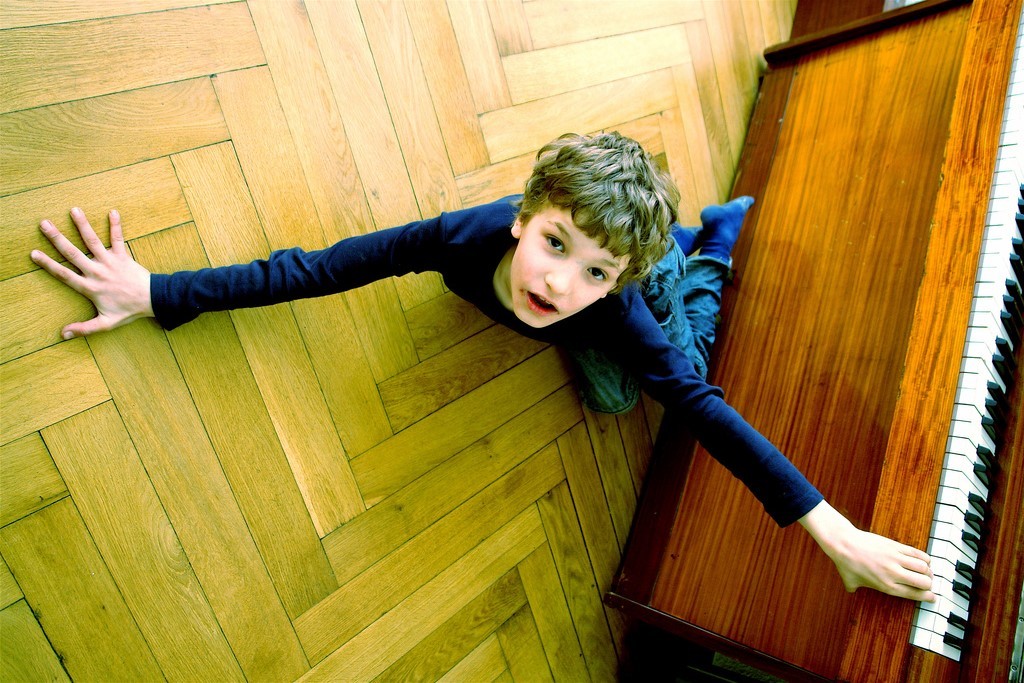The next time your kid becomes agitated or throws a tantrum because they want to play their favorite video game instead of participating in that family outing, try sending them to piano lessons instead of their room.

Scientists have now found a direct correlation between studying music and the emotional and behavioral maturation in children. This remarkable discovery adds to decades of research linking music lessons with higher IQ scores, improved ability to learn languages, enhanced spatial-temporal reasoning, and elevated memory skills. Studying music early on has even been credited with staving off dementia in later life.
The Research
Researchers at the University of Vermont College of Medicine conducted one of the largest studies ever on the effects of music education on brain development. Using a massive MRI database, they took brain scans of 232 healthy children from 6-18 who played a musical instrument. “What we found was the more a child trained on an instrument,” said James Hudziak, a lead researcher in the study, “it accelerated cortical organization in attention skill, anxiety management, and emotional control,” the Washington Post reported.
Why the study matters
With so many cuts to music programs across North America, despite the mountain of evidence showing the cognitive, physiological and now emotional/behavioral benefits associated with learning an instrument, it’s disturbing to learn fewer and fewer children and teenagers are being exposed to music through the public education system. The authors also pointed out another alarming statistic: three-quarters of high school students “rarely or never” receive extracurricular lessons in the music or the arts.
With music studies often treated as optional or “frill” programs by many school boards, the message that it sends can be confusing. Conscientious parents must wonder if studying music is really that important or whether other activities requiring less commitment and resources could be just as effective in building happy, well-rounded successful adults. A recent landmark study from Germany tracking the long terms effects of music lessons on children compared to other activities found “music improves cognitive and noncognitive skills more than twice as much as sports, theater or dance“. The researchers also found that children who took music lessons “had better cognitive skills and school grades and are more conscientious, open and ambitious“.
Why it’s all worth it
On a recent visit to my home, one of my children after muttering a brief greeting made a beeline right to my grand piano. As I listened to him effortlessly knock off some challenging jazz standards, the gratification I felt was second only to the unmistakable joy and satisfaction that he was obviously experiencing. Simultaneously I recalled the numerous times as a child he begged us to quit lessons; thankfully we were able to hold our ground long enough to allow enough time (and practice) to pass, so these magical moments could be savored for the rest of his life.

Experiencing first-hand the principle of “sticking with it” was just one of many important life lessons learning how to play a musical instrument taught him.
For me though, the real prize is the music itself. If there was no other benefit to learning music than just experiencing the kind of joy that comes from being able to play an instrument or sing, it would still be worth every sacrifice, every sour note, every dollar and every whine and gripe we might endure along the way. Being able to make music is a sublime and transformative experience that profoundly enriches one’s life. Ask anyone who can make music, and they’ll nod in agreement. The fact that music makes you smarter healthier and happier just adds more delicious layers of icing on top of an already well-frosted cake.
Featured Image: Image Credit
“I remember loving sound before I ever took a music lesson. And so we make our lives by what we love.” —#JohnCage #ValentinesDay
— Whitney Museum (@whitneymuseum) February 14, 2016
Music can change your life, but so can an amazing music teacher. #GROWtheGood https://t.co/X56vKLYJML
— Life is Good (@Lifeisgood) February 15, 2016
Related Articles:
New Research Shows How Music Lessons During Childhood Benefit the Brain for a Lifetime
As a sometime musician, it’s only natural that I want my four-year-old daughter to take an interest in music. Sure, it’s a fun bonding activity, and sure, there may be a bit of a stage dad lurking inside me at times. But I’m also convinced of the tangible benefits playing a musical instrument can have on one’s personal development. New science, it seems, backs up this intuition. The Washington Post reported last year on a recent study from Northwestern University which found that “Music training not only helps children develop fine motor skills, but aids emotional and behavioral maturation as well.” Via Open Culture
The Benefits Of Music Lessons
Due to budget cuts and governmental funding problems, public schools around the country have had to consider eliminating extracurricular activities such as music programs in an effort to save money. If your child or grandchild’s school lacks a music program, providing them with private music lessons may be a worthwhile investment in their future. Researchers are finding that music lessons don’t simply improve a child’s ability to play an instrument—they also help improve cognitive, emotional, and behavioral development. Via Joan Lunden
Low-Income Kids Benefit From Music Class, Show Greater Reading Skills
Music classes are usually cut first when schools reevaluate their budget. But a new study from Northwestern University shows these classes are valuable, especially to low-income children.
Researchers cited low socioeconomic status affects a child’s reading abilities through a combination of their environment and reduced access to reading materials. This means they spend less time reading, which then means their reading fluency and vocabulary is inhibited. Since music and language skills stem from auditory processing, researchers decided to measure the impact music classes have on low-income children. Via Medical Daily

